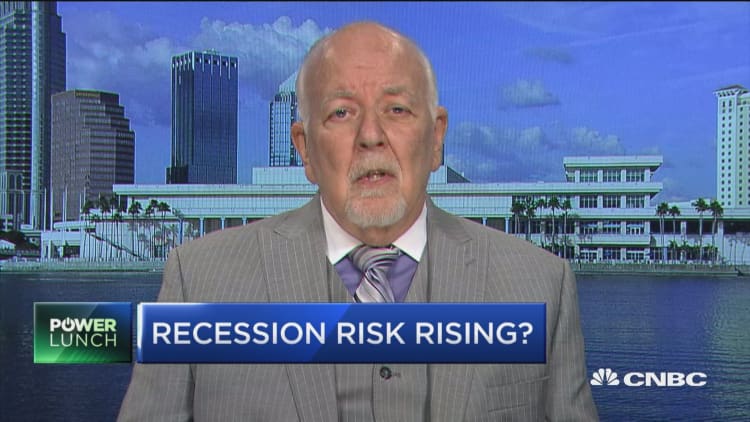
There is a 60 percent chance that a recession will hit the United States by the end of next year, veteran bank analyst Dick Bove predicted Friday.
If that happens, it will be the fault of the Federal Reserve and its "fivefold" increase in interest rates, he told CNBC.
To assume that all the people who financed trillions of dollars at the lower rate "can automatically adjust to the higher rate without any negative consequences is, I think, a major mistake," the chief financial strategist at Rafferty Capital Markets said on "Power Lunch."
The Fed, which began raising rates in December 2015, voted on Thursday to keep the federal funds rate in a range of 2 percent to 2.25 percent. However, officials have indicated one more rate hike this year and three more in 2019.
The central bank has said it wants to get interest rates to a neutral rate, but Bove said "there is no such thing."
He addressed the issue last week in an essay for CNBC, writing that the Fed is "imposing a new rigid financial system on the economy." He argued that it appears the Fed "simply made up" the concept of a neutral rate.
Bove also pointed to the slowing growth in money supply, which is taking money away as well as making the capital that is available more expensive on a relative basis.
He's not alone in his thinking. Sri Kumar, president of Sri-Kumar Global Strategies, told "Power Lunch" on Thursday that he expects a recession by the end of 2019 or early 2020.
"The Fed has ignored global realities," he said. "The Chinese developments with respect to debt, with respect to the trade war, are going to have a much bigger impact on 2019 than the Fed anticipates."
And he doesn't think the central bank changing course now will have much of an impact.
"It is already baked in in terms of the future outlook of the economy, especially when you take the rest of the world into account," Kumar said.
However, Kathy Bostjancic, director of U.S. Macro Investor Services at Oxford Economics, said the Fed is being "prudent."
"The post-crisis economy is well behind us. You can see that with a number of indicators. The labor market particularly is red hot and has shown no signs of slowing," she told "Power Lunch" on Friday.
Bostjancic said she doesn't think the anticipated path of rate hikes "necessarily derails the economy or sends us into recession."


